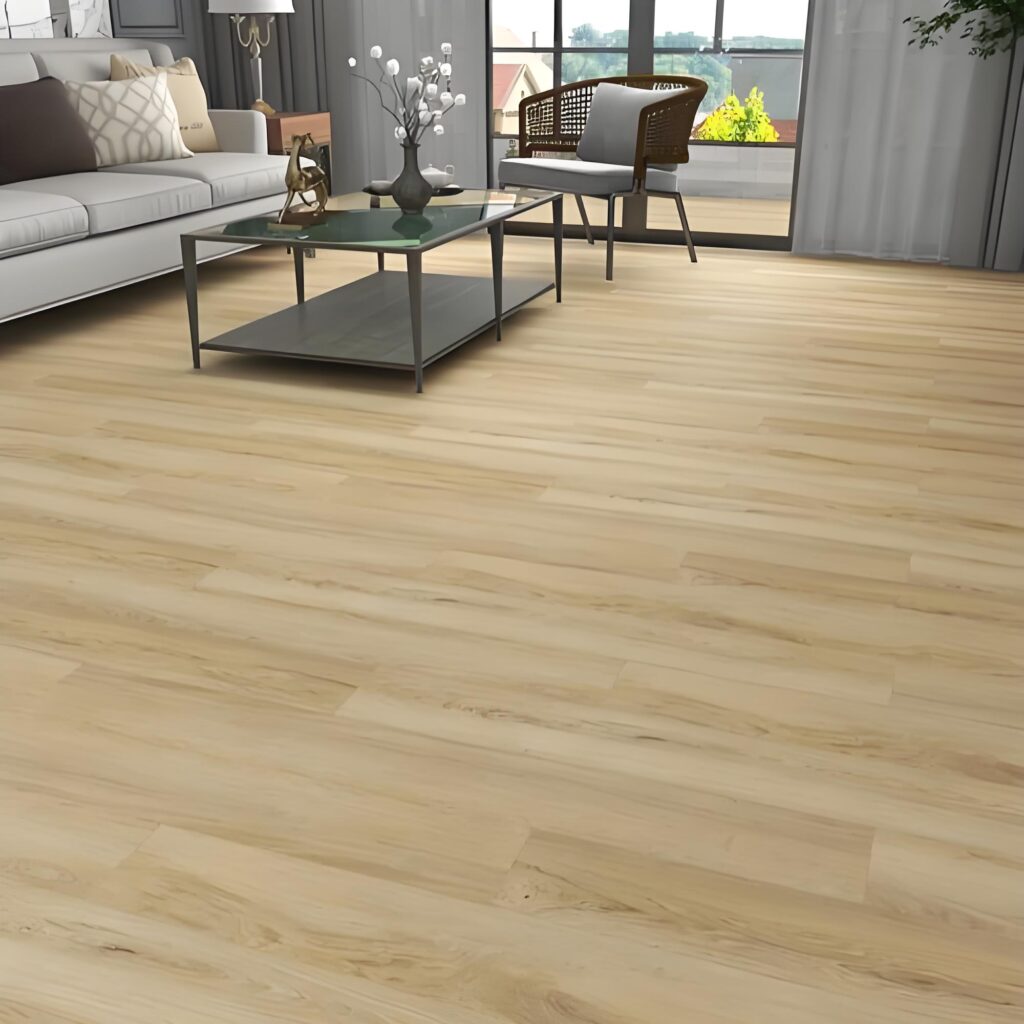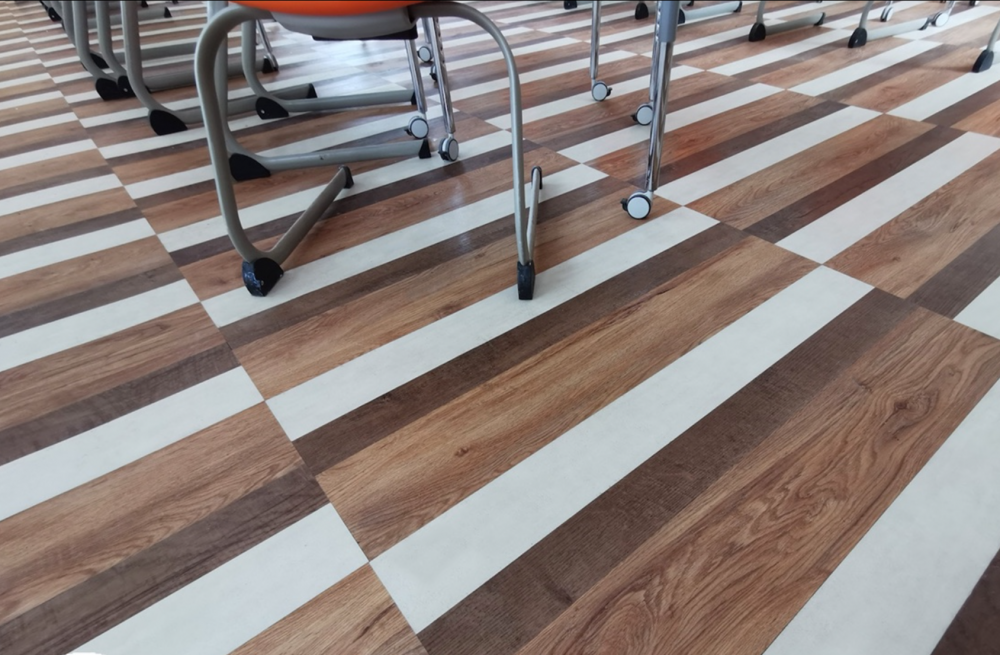When it comes to choosing the right vinyl flooring for your home or commercial space, two popular options are taking center stage: SPC (Stone Plastic Composite) and WPC (Wood Plastic Composite). These two types of vinyl flooring share many similarities, but there are distinct differences that may influence your decision.
In this comprehensive guide, we’ll take a deep dive into the features, advantages, and drawbacks of both SPC vinyl flooring and WPC vinyl flooring, helping you make an informed decision for your next flooring project.

What is SPC Vinyl Flooring?
SPC flooring, short for Stone Plastic Composite flooring, is a type of rigid core vinyl flooring. As the name suggests, SPC flooring is made from a blend of limestone (calcium carbonate), PVC, and stabilizers, which create a highly durable and rigid core. This rigid core is designed to make the floor both moisture-resistant and more stable compared to traditional vinyl options.
Key Features of SPC Flooring:
- Durability: SPC floors are known for their resilience and ability to withstand heavy traffic and wear.
- Water Resistance: One of the key benefits of SPC vinyl flooring is its excellent water resistance, making it ideal for bathrooms, kitchens, and basements.
- Stability: The rigid core prevents expansion and contraction due to temperature or humidity changes, making it a great choice for areas with fluctuating conditions.
What is WPC Vinyl Flooring?
WPC flooring stands for Wood Plastic Composite flooring. Like SPC, WPC floors are made from a mixture of wood fibers and PVC. However, the key difference is the use of wood plastic composite material, which gives WPC floors a slightly softer, more cushioned feel compared to SPC flooring.
Key Features of WPC Flooring:
- Comfort: The wood composite core makes WPC flooring softer underfoot, providing a more comfortable walking experience.
- Sound Absorption: WPC floors are also known for their ability to reduce noise, making them a popular choice for multi-level homes or apartment buildings.
- Water Resistance: While WPC flooring is also water-resistant, it may not offer the same level of protection as SPC in extreme moisture conditions.
SPC vs WPC: Key Differences
While SPC vinyl flooring and WPC vinyl flooring share similarities in terms of installation methods and visual appeal, they differ significantly in their construction and performance. Let’s compare the two side by side.
| Feature | SPC Flooring | WPC Flooring |
|---|---|---|
| Core Material | Stone Plastic Composite (Limestone + PVC) | Wood Plastic Composite (Wood fibers + PVC) |
| Durability | Highly durable, resistant to dents, scratches, and wear | Durable but softer compared to SPC, more prone to dents in high-traffic areas |
| Water Resistance | Superior water resistance, ideal for wet areas like bathrooms and kitchens | Good water resistance, but may not perform as well as SPC in high-moisture environments |
| Comfort | Harder underfoot, less comfortable for standing for long periods | Softer underfoot, more comfortable for prolonged standing |
| Sound Absorption | Less sound insulation, may require an underlayment for noise reduction | Better sound absorption, quieter walking experience |
| Cost | Generally more affordable than WPC | Slightly more expensive due to the wood fiber content |
| Temperature Stability | More stable in extreme temperatures and humidity | May expand or contract more than SPC in fluctuating climates |
| Eco-Friendliness | Can be more eco-friendly due to natural stone components | More eco-friendly than traditional vinyl due to wood fibers |
Benefits of SPC Flooring
1. Extreme Durability
The rigid core of SPC vinyl flooring provides incredible durability, making it resistant to dents, scratches, and impact. This makes SPC a great choice for high-traffic areas, such as living rooms, kitchens, and hallways.
2. Waterproof Performance
One of the standout features of Revêtement de sol SPC is its superior water resistance. Thanks to its stone-based composite core, SPC floors can withstand moisture without warping, swelling, or degrading. This makes it a great option for areas prone to spills and humidity.
3. Stability and Strength
SPC vinyl flooring doesn’t expand or contract due to changes in temperature or humidity. This makes it ideal for use in climates with varying conditions, such as homes with underfloor heating or basements.
4. Affordable Price
Compared to other flooring options, SPC vinyl flooring tends to be more affordable. The materials used in SPC flooring are cost-effective, allowing you to achieve a high-end look at a lower price point.
Benefits of WPC Flooring
1. Comfortable and Cushioned Feel
WPC vinyl flooring features a wood plastic composite core, making it softer underfoot than SPC flooring. If you’re standing for long periods or want a more comfortable feel in your living spaces, WPC flooring is a great choice.
2. Sound Absorption
Thanks to the structure of the wood composite core, WPC vinyl flooring absorbs sound better than SPC. This makes it ideal for apartments or homes with multiple floors, where noise reduction is a priority.
3. Resistant to Wear and Tear
While not as durable as SPC in terms of impact resistance, WPC flooring is still highly resilient. It can handle regular foot traffic and everyday wear and tear with ease.
4. Aesthetic Appeal
The look and feel of WPC flooring are often compared to that of hardwood flooring. WPC can be an excellent choice for those looking for a warm, natural appearance without the upkeep of traditional wood floors.

Which One is Right for You?
When it comes to choosing between SPC vinyl flooring and WPC vinyl flooring, the best choice depends on your specific needs:
- If you are looking for waterproof durability, extreme stability, and affordability, Revêtement de sol SPC is the way to go.
- If you prioritize comfort, sound absorption, and a softer feel underfoot, then WPC flooring might be your best choice.
Conclusion
Both SPC and WPC vinyl flooring offer unique advantages, making them excellent choices for various applications. Revêtement de sol SPC shines in areas where durability, water resistance, and stability are paramount, while WPC flooring excels in comfort and sound insulation, making it a good option for areas where noise reduction and a softer surface are needed.
Ultimately, the decision between SPC and WPC comes down to your specific needs and preferences. Consider factors like the type of space, traffic level, and moisture conditions before making your final choice. Both flooring types provide an excellent combination of beauty, functionality, and long-lasting performance, so you can't go wrong with either!
If you're ready to enhance your home with high-quality SPC or WPC vinyl flooring, don’t hesitate to explore your options with reputable suppliers and manufacturers.

